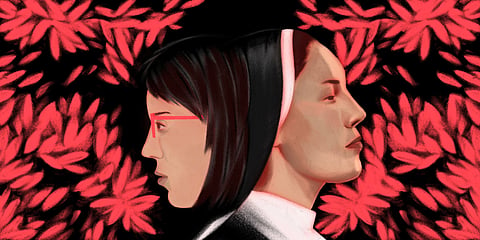You walk towards the music. You miss everyone you have ever loved in your life. And regret all the decisions you have thoughtfully made. Music can do that to you sometimes.
Nostalgia has always been the unkind love of your life.
You wonder whether the piano is not tuned. But, as you climb up the wooden stairs step by step, as you draw closer and closer to the melody, you know in your heart that it is bass played as treble. And you feel that the notes are going down and down, from a line to a space, a line to a space in the stave. And you stop. You have come as far as you could. You look at the half-closed mahogany door and the wavering dim light from a rusted revival sconce beyond it. There's still more darkness than light. You sigh and turn around, climbing down step by step, slowly, to the rhythm played upstairs. But you cannot keep up with the fading, uneven tune. As you come out of Mary Magdalene Hall, you walk towards the playground. Somewhere between the deep red carnations and the colourful bougainvillaea terrace, you hear the music stop.

